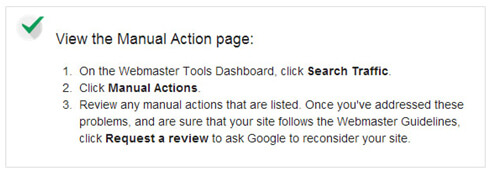Are you experiencing traffic losses or a decrease in rankings? You may have suffered a manual penalty. Here’s what to do and how to recover.
With up to 5,000 reconsideration requests per week, you can imagine that Google isn’t being too frugal with their manual penalties. Even if you have managed to escape the algorithm updates, your site still may receive a manual penalty if it doesn’t adhere to Google’s Webmaster Guidelines. Suspect your site has been hit? Here’s how to know for sure and more importantly, how to recover.
Have you been hit?
If you see a drop in traffic, a decrease in your website’s performance, or notice that your website isn’t coming up in the search results at all, it indicates that you may have been slapped with a manual penalty. Unless you’ve received a notice from Google itself, the next step is to check the Manual Action page in your Webmaster Tools account to confirm a penalty.

If you do have a penalty, Google will list whether the penalty affects the entire site (site-wide matches) or just specific URLs (partial matches), along with reasons that you may have received the penalty.
Identifying the issue
If the manual action is listed, you have a pretty good idea of where to dive in and begin fixing. If not, you’ll have to do a site audit and look for anything that doesn’t follow Google’s quality standards. Some of the most common things to look for are:
Unnatural links to your website
What to look for: If you’ve engaged in buying links or exchanging links, it’s very likely this could be the reason you’ve been penalized. Use Webmaster Tools to download a list of links that point to your website and review them for quality. You’ll want to look for spam sites that are linking to yours and also look at the anchor text of the backlink to see if it is natural.
How to fix it: Make a list of the links that violate Google’s guidelines and contact the webmaster asking to have the link removed, or a rel=”nofollow” tag added to the link so that it does not pass PageRank. For any spam links that you cannot get removed, you can use the Disavow Tool in Webmaster Tools. However, use the Disavow Tool only as your last resort and be careful when disavowing links to be sure you don’t accidentally disavow quality links that are actually helping your rankings.
Unnatural links from your website
What to look for: Unnatural links from your website can also result from link purchasing, link exchanges or distributing content containing backlinks at mass scales. Comb through your website for links that have been purchased, are involved in a link exchange or have been distributed at large scales in articles or press releases.
How to fix it: Once you’ve identified links that violate quality guidelines, you can either remove the links from your website completely or use the rel=”nofollow” tag to the links.
Hidden text or keyword stuffing
What to look for: To look for hidden text, you can select all text on each page to look for any text that is the same color as the background. You can also Fetch as Google to look for any content that is visible to the search engines, but not to users. To identify keyword stuffing, check your title tags, meta descriptions and content for excessive use of repetitive keyword phrases.
How to fix it: If you find any hidden text within your website, remove it, or make sure that is visible so that users can see it as well. Remove any excessive keyword phrases and aim to create content that sounds and is visible for users who view your website.
Thin content
What to look for: If you have very minimal content on a page, or content that is not valuable to users (like duplicate or automatically generated content) this could be grounds for a penalty. You can look for duplicate content across the web with a tool like Copyscape.
How to fix it: Every page on your website should have valuable and original content that is useful to users. Any pages that have very little to offer, should have the rel=”noindex” tag added to them, so that they will not be indexed in the search results. Sometimes you can’t avoid having very similar pages. Say for instance, you sell a certain T-shirt and it comes in several colors, each color having a separate page. If that’s the case, you should use the rel=”canonical” tag to identify the authoritative page.
The road to resubmission
Once you have identified the issue, make a detailed account of all of the actions you’re taking to resolve it. Show Google exactly which links you’ve removed, what content you’ve added or which tags you’ve implemented. The more detailed you can be, the better. Once you’ve thoroughly looked through your website and taken care of any issues that violate the guidelines, you can request reconsideration for your website.
After Google has reviewed your website, you will receive a message in your Webmaster Tools account. If you have resolved the issue and your site is no longer in violation of the guidelines, the penalty will be revoked. If they’re still seeing an issue, it’s time to go back to the drawing board and conduct a deeper analysis of your website. The road to resubmission can be a rocky one, but cleaning up your site will benefit you in the long run, creating a better experience for you, your users and the search engines.
If you believe your site has a manual penalty and aren’t sure which steps to take, contact us for a free evaluation of your website.
Submitted by Erica Machin, Titan Growth

